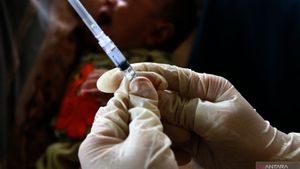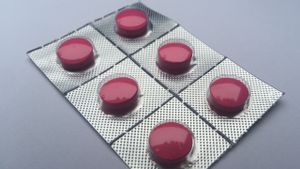JAKARTA - In general, breastfed babies have a higher chance of developing jaundice than formula-fed babies. Jaundice is most easily recognized by the yellowing of the baby's skin. This occurs because there is too much bilirubin in the blood which is a byproduct of the breakdown of red blood cells. Normally, the liver excretes this excess bilirubin in the urine or stool. However, in newborns, the liver is not fully mature so that the expenditure process is not maximized.
Launching Parents.com, Thursday, January 20, more than half of babies experience jaundice in the first week of birth and will disappear on its own within two weeks. However, if it does not improve, this condition can be a sign of serious diseases such as brain damage, cerebral palsy, to hearing loss.
Bilirubin in babies is actually already in the womb which is produced by the placenta. After birth, bilirubin from the new bloodstream will be filtered by the liver and released into the intestinal tract.
Jaundice in infants is often referred to as physiological jaundice. In addition to liver that has not developed optimally, jaundice is also caused by several conditions such as;
Sepsis in the baby Viral or bacterial infection Internal bleeding Liver damage Deficiency of certain enzymes Abnormal red blood cells of the baby that break down easily Rhesus and blood group incompatibility between mother and baby Problems with the baby's digestive system, including biliary atresiaPremature babies and babies who have difficulty consuming breast milk are also at high risk for jaundice. The specific symptoms that indicate jaundice in infants are:
Yellowing of the skin and eyes No weight gain Lethargy or drowsiness Frequent crying Fever VomitingBabies with high bilirubin levels can be treated in two ways, namely;
Phototherapy, to convert bilirubin into a form that is easily broken down by the liver using special light Exchange transfusion, which is the process of removing the baby's blood using a catheter placed in a vein and replacing it with blood from a matched donorYou can prevent the increase in bilirubin that can cause jaundice by giving him adequate food intake. Breastfed babies should feed 8–12 times a day for the first few days of life.
For formula-fed babies, you should give 30–60 ml of milk every 2–3 hours during the first week after birth to prevent an increase in the level of bilirubin in the baby's blood.
Adequate food intake is also able to overcome excess bilirubin in the baby's blood, which will later be excreted through the feces.
If your little one has jaundice, you should have their condition checked regularly, especially on the whites of the eyeballs and skin. This examination should be done 2 times a day to see if the condition has returned to normal or is getting worse.
If the condition of the jaundiced baby does not improve after 14 days, immediately consult a doctor for treatment. Prompt and appropriate treatment will reduce the risk of a jaundiced baby experiencing permanent brain damage.
The English, Chinese, Japanese, Arabic, and French versions are automatically generated by the AI. So there may still be inaccuracies in translating, please always see Indonesian as our main language. (system supported by DigitalSiber.id)








